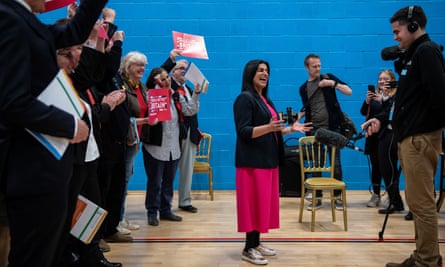Labour’s performance looked a lot better at dawn than it did at 3am. Every year recently, the very earliest declaring councils have tended to provide some of Labour’s less impressive results – Sunderland, Basildon, Dudley, Harlow – and conditioned journalists and experts to start thinking about local elections in terms of Labour underperforming.
Measuring performance in seat gains and losses also distorts the picture. In the big cities that elect a third of their councillors at a time, one seat will represent more than 10,000 electors, while in the smaller rural districts there may only be 1,000 people for every councillor. Labour making solid progress in urban marginals does less for the seat count. There is correspondingly more room for the other anti-Conservative parties with better prospects in rural England to gain impressive numbers of seats.
Local elections are always uneven, all parties will perform patchily and be disappointed by some places. Labour could have hoped for better on Friday in Peterborough or Ipswich, for example. On the other hand, Labour polled the most votes at local level in areas where the Conservatives had five-figure majorities in the December 2019 general election such as Bassetlaw and Dudley North.
The local elections give some plausible grounds for Labour to hope that the realignment of 2019 might prove ephemeral and that despite the huge swings required, these are still winnable seats. Hartlepool and Grimsby returned to the fold. For the second year in a row, Labour showed surprising vitality in Midlands towns such as Redditch and Tamworth where the party’s cause looked dead. Gains in Rushmoor, the local authority covering the home of the British army at Aldershot and Farnborough, also suggested that the party had prospects for unprecedented progress in the urban south.
Starmer’s party was about nine to 10 points ahead if you analyse these elections like a national opinion poll; Blair’s party was 14 points head in 1996. Labour won Medway council on Thursday night with a majority. When it voted on the same day as the 1997 general election, Labour fell just short.
The overnight results from the commuter belt councils such as Windsor and Maidenhead and East Hertfordshire gave the Conservatives a glimpse of the Friday results, many of which in the south and Midlands were worse even than the exaggerated expectations circulated for public consumption.
The new deputy prime minister, Oliver Dowden, quickly experienced something his predecessor Dominic Raab endured last year, namely a trouncing in the local elections in his constituency. Friday brought crumbs of comfort for the Tories from Solihull and Redcar, but also electoral meltdowns in Bracknell Forest and Swindon and the dashing of hopes that they would recover scores of seats lost to independents in 2019. The count of Conservative seat losses ticked upwards in the direction of that fateful number of 1,000, which felt so unreal when the party chairman, Greg Hands, trailed it during the campaign.

Local elections are always surprising in their rich detail and variation, but the broad pattern is usually explicable. The Conservatives have been in government for 13 years, living standards and public services are under pressure, and although better-regarded than his predecessors, the prime minister is not very popular.
In the circumstances, one would expect the Conservatives to get a trouncing in the local elections from an unhappy, tired electorate. Main opposition parties very rarely arouse wild enthusiasm, particularly if they are already in power in the town hall and making unpopular decisions. The 2023 elections, encouraging as they are, do not show the road clear to Labour winning a majority in the general election. But they are certainly the sort of result endured by a government that is on its way out.














